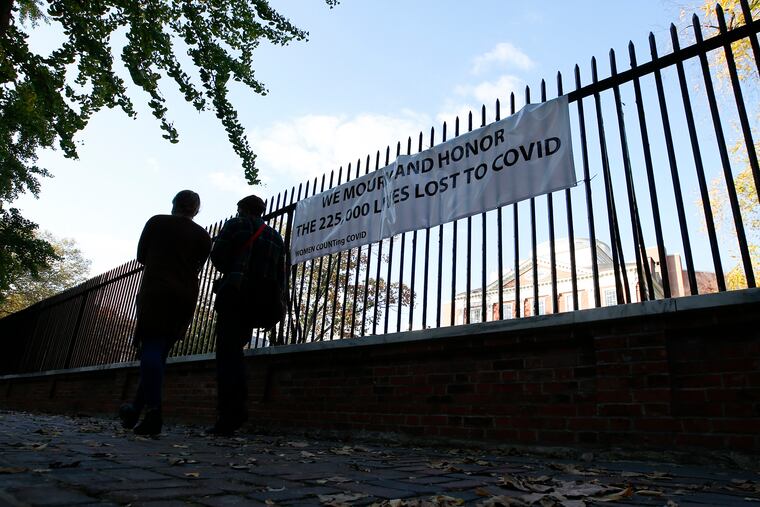Rising percentages of people testing positive in Philly, Pa., and N.J., but amid COVID-19 surge, ‘it is safe to vote’ in person
People in quarantine for COVID-19 can receive assistance with voting, Pennsylvania Health Secretary Levine said. New Jersey officials asked people not to travel for Thanksgiving.

As Pennsylvania continues to see climbing coronavirus case numbers, Health Secretary Rachel Levine said voters should feel safe going to the polls for Tuesday’s presidential election.
“If you are voting in person, it is safe to vote,” Levine said Monday. She urged voters to wear masks, bring their own pens, bring hand sanitizer, and download the state’s contact tracing app, COVID Alert PA, before heading to the polls.
No one in quarantine for COVID-19 will be prevented from voting, Levine said Monday, responding to a “completely false” widely shared social media post that incorrectly indicated that the commonwealth was prohibiting quarantined Pennsylvanians from voting.
Pennsylvania reported more than 2,000 new cases for the sixth day out of seven, and New Jersey reported more than 1,000 for the 13th day in a row. In both states, the proportion of people testing positive is rising and is above 5%, which is considered the threshold of concern by epidemiologists.
The number of related hospitalizations also continues an upward trend in both states, although the numbers remain far below the levels seen in April, and the proportion of infected people who are hospitalized is much smaller. Still, both Pennsylvania and New Jersey saw hospitalizations more than double in October, while hospitalizations were up 69% in Delaware, according to state data.
To contain the spread of the virus, New Jersey officials urged people not to travel this Thanksgiving. Pennsylvania officials told residents last week to cancel gatherings with anyone outside their households.
“We know this won’t be the Thanksgiving we are used to having, but if we all recommit to fighting this virus together we can hope that the state is in a better place in time for the holidays,” New Jersey Health Commissioner Judith Persichilli said. “Our behavior will determine the path forward.”
» READ MORE: A guide to coronavirus safety when you vote in person
Pennsylvania reported 2,060 newly confirmed cases on Monday and 1,909 on Sunday. Five additional deaths were reported Sunday, according to state data, and six were reported Monday.
The statewide positivity rate of coronavirus tests has risen to 6%, Levine said, and 40 of Pennsylvania’s 67 counties now have rates above 5%. Among them are Delaware County, with a 6.9% positive test rate, according to state data, and Philadelphia County, with 7.8%.
Both of those counties are considered by the state to have a “substantial level” of community spread, while Bucks, Chester, and Montgomery Counties have “moderate levels.”
Philadelphia reported 941 new cases Monday, representing test results collected since Friday.
Hospitalizations have been “steadily climbing” in recent weeks, Levine said, but are not as high as they were in the spring. On Monday, 1,267 people were in hospitals with the virus, the health secretary said, and that number is expected to rise in the coming weeks, as hospitalizations typically lag behind spikes in cases.
Pennsylvanians who have been quarantining because of coronavirus exposure can contact the Department of State for voting assistance if needed, state officials said.
Anyone who can’t vote in person can submit an emergency absentee ballot application by 8 p.m. Tuesday, or assign a designee to deliver their ballot. If someone cannot find a designee, the county election office is required to have a county official act as one, said Pennsylvania Secretary of State Kathy Boockvar.
As part of contact tracing, health officials alert people who may have been exposed to the coronavirus and advise them to quarantine for 14 days. The notifications are standard and unrelated to voting or the election, Levine said, saying the Department of State would help anyone in quarantine exercise their right to vote.
» READ MORE: In Pennsylvania, COVID-19 is now a rural, urban, and suburban problem
New data Monday from the Kaiser Family Foundation’s COVID-19 tracker showed that Black and Hispanic residents have been affected at disproportionate rates — especially in Pennsylvania.
Hispanic people make up only 7.6% of the population, but, as of Monday, 23.2% of the coronavirus cases. Black residents constitute 10.8% of the population, but 21.8% of the cases.
Pennsylvania was one of just 10 states where the share of cases among Black patients was twice their share of the population, and one of five states where the percentage of cases among Hispanic patients was more than three times their share of the population, said Samantha Artiga, the director of KFF’s Racial Equity and Health Policy Program.
» READ MORE: Data: Tracking COVID-19 in Pa. and N.J.
New Jersey reported 1,379 new cases and three deaths on Monday. South Jersey has a higher rate of positive tests than the northern part of the state, at 6.47%, Persichilli said. Statewide, the transmission rate is 1.28, meaning each case is resulting in more than one additional infection.
“We’ve been here before, those difficult days in March and April,” Persichilli said. “Back then all of you did the hard work to bring down our case numbers. You took personal responsibility. All of you responded to the call to protect one another from COVID-19. We need to continue vital prevention efforts.”
Staff writers Aubrey Whelan, Rob Tornoe, Stacey Burling, and Laura McCrystal contributed to this article.